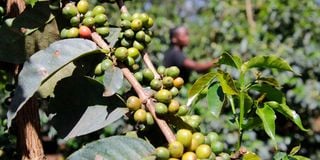Plan to tax farm produce sparks anger in Mt Kenya

A farmer tends to her coffee in Nyeri town on October 25, 2022.
What you need to know:
- Mt Kenya MPs have been at pains to explain how they passed the Finance Act, 2023.
- According to Treasury CS Prof Njuguna Ndung'u, the agricultural sector is under-taxed.
The move by the government to introduce an agricultural tax has rattled farmers in Mt Kenya and threatened to reduce the immense support the Kenya Kwanza administration enjoys in the region.
The tax has caused bad blood between locals and their leaders, whom they accuse of doing little to protect them.
MPs in the region have been at pains to explain how they passed the Finance Act, 2023, leading to the taxes.
On Wednesday, National Assembly Finance and Planning Committee chairperson Kimani Kuria, who had vehemently defended the law during debate in the House last year saying it had accommodated the views of all Kenyans, said it did not provide for the taxing of farmers.
Speaking in Maragwa Constituency in Murang’a County, Mr Kuria, who was among a host of MPs who had accompanied Deputy President Rigathi Gachagua during the official opening of a coffee factory, said the Act only required the registration of farmers on the Electronic Tax Invoice Management Systems (e-Tims).
The registration, he said, is crucial to get data on the amount of crops produced in the country and weed out traders who flood the market with imported agricultural produce claiming to have bought them locally.
“It is happening in the milk sector where some people bring the commodity from outside the country and claim to have bought it from local farmers,” Mr Kuria said.
He said the government wants to remove brokers in the crops value chain and avoid abuse of importation rules.
Agricultural produce
“KRA [Kenya Revenue Authority] should stop harassing hard-working farmers,” Mr Kuria said.
Maragua MP Mary Wamaua echoed Mr Kuria’s sentiments, telling farmers who attended the event that “you have now heard from none other than the Finance committee chairman.”
Gatanga MP Edward Muriu said taxation on agricultural produce is contrary to what the Kenya Kwanza administration had promised during the campaigns.
“We promised to increase the money in farmers’ pockets,” Mr Muriu said.
On February 26, KRA officers were chased away from a meeting of avocado farmers in Kandara, Murang’a County, after they demanded that farmers register on e-Tims before selling their produce.
Farmers have refused to sell their produce to aggregators and exporters for fear of being taxed, leading to a drop in prices and a glut in the market.
Murang’a accounts for 21 per cent of the avocado produced in the country, with Kenya being the sixth major producer worldwide.
In January, Nyeri Woman Rep Rahab Mukami led local leaders during a meeting presided over by Co-operatives Cabinet Secretary Simon Chelugui in opposing a five per cent tax for agricultural produce.
Under-taxed sector
She said farmers were faced with high costs of production and it would be wrong for them to be hit with additional tax.
“The tax will not help farmers,” Ms Mukami said.
National Treasury Cabinet Secretary Njuguna Ndung'u, in a medium-term revenue strategy, wants every farmer delivering their produce to the markets to pay Sh5 for every Sh100 obtained from sales.
According to Prof Ndung'u, the agricultural sector is under-taxed, yet it's the highest employer compared to other sectors.
“The economy is dependent on the agricultural sector, contributing an average of 21.2 per cent of the GDP [Gross Domestic Product] ,” the document says.
The displeasure caused by the agricultural tax among farmers has forced Deputy President Rigathi Gachagua to intervene.
In a meeting with the growers on Tuesday, Mr Gachagua said the issues they had raised will be addressed.
Speaking when he hosted avocado farmers at his Karen residence in Nairobi, Mr Gachagua said deliberations are ongoing to review some provisions in the Finance Act, 2023.





